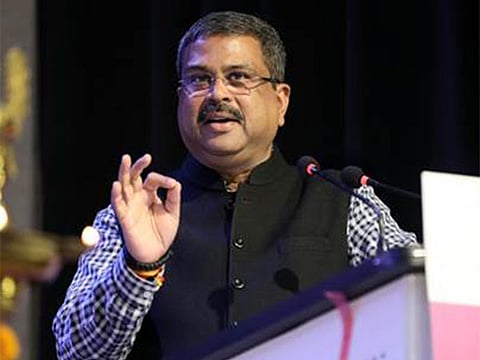

Union Education Minister Dharmendra Pradhan has countered Tamil Nadu Chief Minister MK Stalin’s objections to the three-language policy under the National Education Policy (NEP) 2020, stating that it is inappropriate to view the policy through a “myopic vision” or misrepresent reforms as threats for political purposes.
In a written reply to Stalin, Pradhan asserted that the Central government remains committed to promoting Tamil language and culture globally. His response comes after Stalin wrote to Prime Minister Narendra Modi, alleging that Samagra Shiksha funds for Tamil Nadu were not being released and raising concerns over the perceived imposition of Hindi through the three-language policy.
Pradhan clarified that NEP 2020 does not impose any language on any state or community. As reported by IANS, he emphasised that Tamil is a national treasure, and one of the policy’s core objectives is to revive and strengthen Indian languages, including Tamil, which have been sidelined over time.
The minister further explained that the three-language policy has been part of India’s education framework since 1968 but was not fully implemented, leading to an over-reliance on foreign languages. The IANS reports that NEP 2020 aims to correct this by ensuring Indian languages regain their place in education.
Pradhan also criticised the Tamil Nadu government’s continued resistance to the policy, arguing that political opposition deprives students and educational institutions of the opportunities it offers.
He highlighted that centrally supported schemes such as Samagra Shiksha and Pradhan Mantri Schools for Rising India (PM SHRI) schools align with NEP 2020 and offer flexible implementation for states.
Calling Stalin’s letter to the Prime Minister a “complete negation of cooperative federalism,” Pradhan pointed out that many non-BJP states have implemented NEP despite political differences. He urged Tamil Nadu’s leadership to rise above politics and prioritise the interests of students, citing Modi’s past statement that “Tamil language is eternal and Tamil culture is global.”
He also referenced initiatives like the Kashi Tamil Sangamam and Saurashtra Tamil Sangamam, aimed at celebrating Tamil Nadu’s cultural connections with other parts of India. During the ongoing Kashi Tamil Sangamam, 41 classical Tamil literary works translated into Hindi were released. Pradhan reiterated that Tamil is among the world’s oldest classical languages and should be embraced as a source of national pride.
